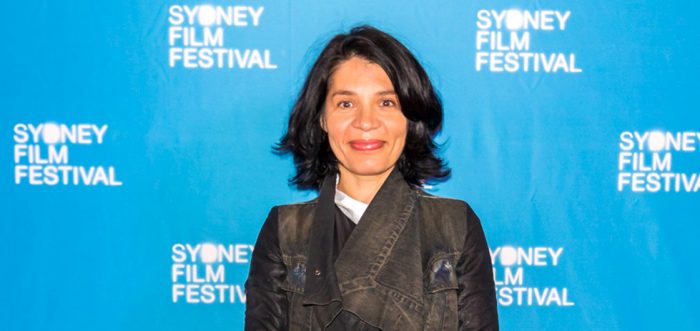Her work long-since preoccupied with the instability and uncertainty of both public and personal life in the Republic of Macedonia, Teona Strugar Mitevska has become a symbol of success for a lesser-known corner of Eastern European cinema. Berlinale favourite When The Day Had No Name (Koga Denot Nemase Ime) is an unflinching cross-section of the socio-political and economic issues plaguing the young Balkan nation, diffracted through six young, troubled male protagonists. We caught up with Teona Strugar Mitevska at Sydney Film Festival to talk about the process of real-life events as inspiration for universal themes, achieving emotional authenticity in her work and the avenues for the distribution of Macedonian cinema.
The film is based around real-life events from 2012, but it’s a springboard for deeper themes about Macedonian society. What was the process like, developing backstories for the six protagonists, so you could address those themes?
You know, you try to speak about as many topics as it is possible to pack into the story but not overdo it. First, I developed the characters and then basically, it’s a matter of allowing characters to lead you towards certain stories or certain important points. I never know how certain things come to the surface and other things don’t arrive to the surface. But, in the creation of the story, I think, for me it was important to address issues that are important for me as a woman. It’s like, “OK, how do we create a better future and address the past accordingly? How can we create a more tolerant society with all the intolerance that surrounds us?” Everything takes a sort of global importance; we are all universally connected by the things that concern us. We want to do good, we want to be good, we want to create a better life for our future generations.
How did you find it, trying to tap into the mindset of younger guys in Macedonia?
Listen, I grew up with them, I grew up in this atmosphere. You know, I initially wrote the dialogue, and then I did 3 months of work with these young men. Between casting and rehearsals and workshopping the whole script, I was thinking that the script, the dialogue, will change [very] much, because you can envision something, but then when you work with the actual protagonists…I thought that the dialogue would change a lot. Actually, of course it changed – but the essence stayed, there was a certain accuracy in terms of the dynamics between the characters. And how did I manage that? Through observation. Well, me and the writer – I have a co-writer who is Bosnian, but she has lived also… you know, the Balkan is the Balkan. And you know, we tapped into, quite accurately, the dynamics of the male kind.
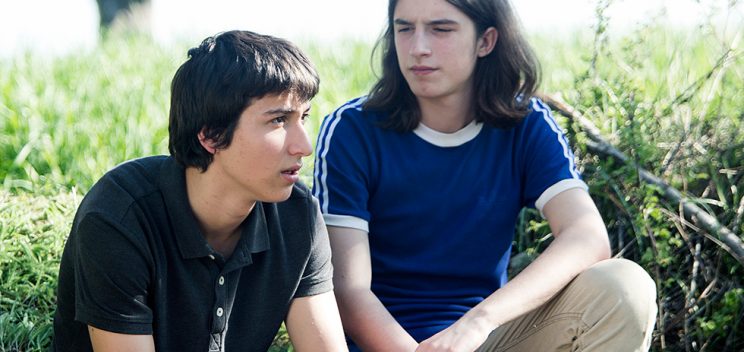
Just on that point, do you think your young actors felt it was authentic when you were workshopping with them?
Totally, totally, because when they did not think it was authentic, we changed it, you know? And they’re not professional actors, so they must tell the truth. They must believe what they say, otherwise they cannot say it. Otherwise, you feel it’s fake. “Teona, I’m sorry, but this does not work.” And then you try something else, and you discuss, and you really try to find your truth.
There are very specific ethnic tensions in Macedonia. Did you have any concerns about how that would translate to international audiences?
Of course, of course. Because you see, Macedonia is 2 million [people]. You hope that for your film, the audience is much larger. We don’t make films for ourselves, we make it so we [can] say something of importance and we hope that more and more people will see it. So, of course you are concerned, but, I truly believe, if you develop your characters in the story well, I think it translates always on a larger level. Really, I think any local story will find its global audience if the story has a soul in it. In the end, it should not be a reason for which you make a film or not. And you should not make alterations because you want more people to see, you should just tell the story you want to tell, in the best way possible.
There’re a lot of concerns about how the past is now affecting the future, and there’s that uncertain feeling of, you know, “What is the future of the country?” What is the future for the young people still there?
You know, you have to redefine it ourselves… So, what has been the concern of Macedonians for the past 15 years? Our concern has to be Macedonians, and to be called Macedonians. What has been the concern of Albanians? To be Albanians, and maybe create Albania. But we have buried ourselves, in all these nationalistic… ideas, ideals, which have nothing to do with who you really are. Of course the country is important, of course “I am Macedonian” – but, it’s like, I don’t know… I care more about creating a future for my people. You know, so that my son has a nice place, a nice future ahead of him. So I don’t know… along the way, nationalism has eaten us alive.
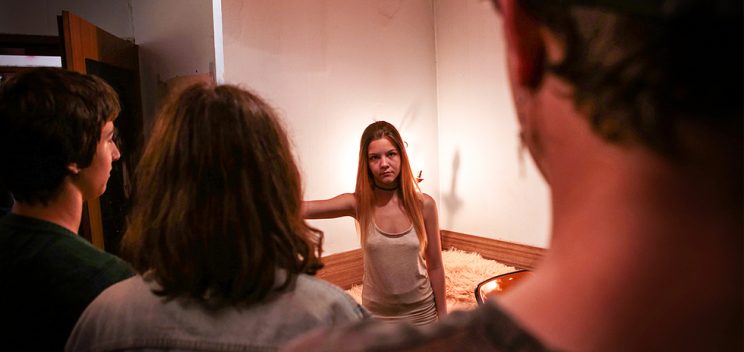
Graffiti is used as a kind of motif throughout the film. Was that something you worked very deliberately to include? You know, the slogans – “Don’t Trust Women” – and also the political relevance of ‘Sarena Revolucija’.
I’m happy you noticed this, yes, of course. There is a lot of work around this, because this is the milieu, this is the painting, what we are surrounded [with]. For example, this slogan, “Don’t Trust Women”, is not something I invented.
No one went and painted it on the wall.
I actually found it. So it’s crazy, but these slogans, this street art – it’s a direct pathway to the mindsets of people. It is a way to express yourself, and also the ‘Sarena Revolucija’, it is a response to the environment. So of course, it was very important for me to integrate it within. Because yes, it’s not something everyone will notice, but how do you create beauty? By little things, you know, I love working on the finer things of things. To complete a picture you paint.
There’s a real sense of claustrophobia in the film. Your DOP, Agnes Godard, captures these closed-in frames… in the Q&A post-screening, you explained that it’s like young people are imprisoned.
Usually I’m very vivid, you know. I use a lot of colour, and in making this film it was important to go against this, to stay cold. To make it brutal, visually, and also, contrived. So from the beginning, it was really the idea. All these elements really help you to experience the lives of these characters as best you can, so this choice was part of the journey to arrive there.
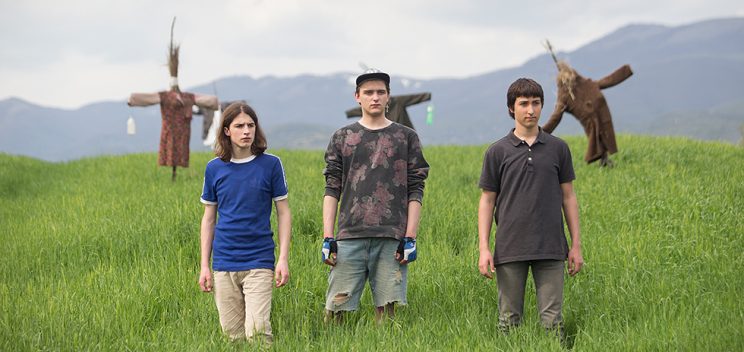
There’s a very unsettling sound design and score that goes with it as well.
Totally, totally, and we worked a lot on the sound, you know. For me it’s like, every time I make a film, like I do the sound at the end, and the music is trying to fix things.
Like a bandaid? [laughs]
It’s like, come on! And I said, my god, I really really hope I manage to make one film where sound is part of the form from the beginning, so that it actually supports the narrative in a proper way, and it takes its own deserved space. And really, the sound and the music [in this film] was worked on from the beginning, from the moment of the scenario, to the end like this. And yes, actually I’m happy you noticed, because it’s very important for me to treat sound accordingly and to give it the space it deserves as an integral part of the cinematic form.
Veta, your first short film, and I think all of your other films have also played at Berlin. What’s your connection to the festival as a filmmaker?
You know, these three big festivals – Berlin, Cannes and Venice – usually, it’s like you become their child. It’s just an opportunity for the film to be seen. Because it’s a Macedonian film. It is an opportunity for the film to get distribution, to be sold… and it’s not necessarily certain that it will happen, but it helps. I’m grateful to be one of their children. Because without their support… you are just as good as your film is. It doesn’t matter what you’ve done before. So it’s like each film you make, you don’t know if you will make the next one. Because you have to write a new script, a good script that people will like, that will be financed… and nothing can be taken for granted, because there is so much competition. And when you make a film that is so specific, so strange, unique or personal in its form, in the way the story is told, the way it’s shot, it comes from Macedonia, it’s a woman’s film, it’s like… it’s almost impossible that films such as this exist. But it exists, and wow! How beautiful is that?
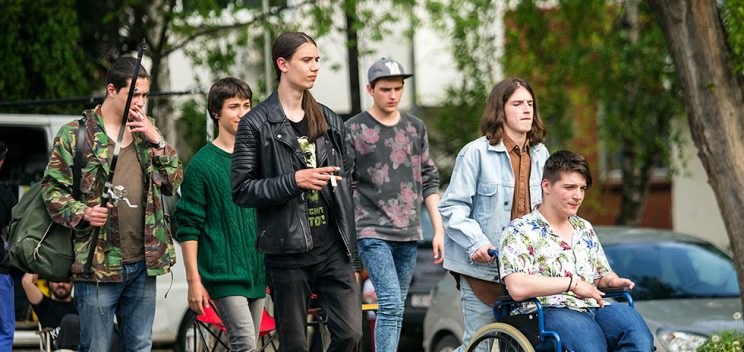
Mentioning distribution, what are the avenues that you feel are out there for Macedonian filmmakers? And have you considered video on demand as a platform?
Yes, totally. I don’t know so much about it. I wish I was more proactive about that. Because we are still stuck on this traditional form of distribution. So you do the festivals, and then you get some territories where the film is released, and you hope you get more territories where the film gets released. None of my films have been distributed on video. And we were approached some time ago by Netflix, and we said, “Oh we don’t know, we will see, blah blah blah.” I don’t know, but to me, it seems that maybe we should all move in that direction. Especially for arthouse cinema. It’s a big question. I love the idea of watching a film in a cinema. And for me, the public not being able to see my films in a cinema – it’s almost painful! But at the same time, I know that we live in a changing world. So it’s a big dilemma for me.
Milcho Manchevski is shooting his first film, Bikini Moon, without any thematic links to Macedonia. Do you, as another established Macedonian director, feel the urge to continue making films about your home country?
Listen, I have two films – two scripts – I’m preparing my next script now and we shoot at the end of October. It’s a Macedonian story. And then I have another one from a very good Macedonian writer – Goce Smilevski, who did Freud’s Sister. And after that, we have also just finished a script that happens in Bosnia, but it stays in the Balkans. There are certain filmmakers that manage to get out of their comfort zone. I’ve lived more outside of Macedonia than in Macedonia, yet I speak all the time about Macedonia. I don’t know if it will happen one day, but to tell you the truth, I don’t care. Why they continue to happen in Macedonia is because they’re issues and stories that concern me, that I want to tell. The moment I have nothing to say about Macedonia, I will move to the next thing.
Any opportunity to boost exposure is good, but it’s also a lot of pressure for directors.
Yeah, but there is no way around it, you know? You have pressure as a woman also! But it is part of the opportunity given to you, it means that you create opportunities for others. It would be devious to do otherwise.
Finally, could you tell us about one of your two new films in development – God Exists, Her Name is Petrunija?
God Exists, Her Name is Petrunija is actually based on a true story also. It was, you know, for ‘vodici’. So basically, whoever catches the cross, will have a lucky year. A few years ago, a woman in Stip, in eastern Macedonia, jumped for the cross, but they took the cross away from her because she is a woman. So she spent a whole night in the police station, persuading, like, “Come on, I won because I swim faster than anybody else, what is this?” This woman goes against all odds, she’s like Joan of Arc, saying, like, “Come on!” She becomes larger than herself, she is a very simple woman who is only looking for justice. And, as the story develops, she becomes this symbol of feminism, although she never intended to be. But she is so strong in her belief and her need for justice, and so persistent, that she will win. And it’s got a lot of absurd moments, [so much so] that there is humour – which I’ve never done before in any of my films – there is actual humour that comes from the situation. It’s so ridiculous.
Those are so interesting, like Roy Andersson’s strange, bleak situations.
Yes, I totally agree, and that is Petrunija’s story, so it’s really actually quite funny.
